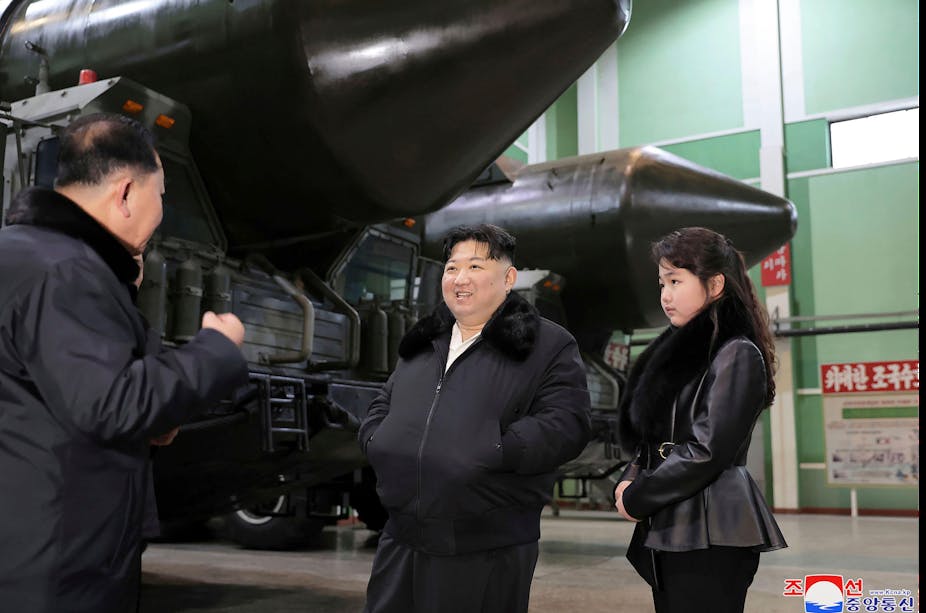North Korea’s leader Kim Jong-un is continuing to ramp up his focus on nuclear weapons and taking a more aggressive military stance towards his neighbour South Korea.
In his 2023 year-end speech, in which he outlined his plans for 2024, Kim said inter-Korean relations had become “a relationship between two hostile countries and two belligerents at war”. For years Kim’s policy has been to attempt to reunify the two countries, which were separated in 1953 after the end of the Korean war. A tight military border has made it almost impossible for ordinary people to pass in or out of North Korea.
The North Korean leader also announced a plan to launch three new military spy satellites in 2024, highlighting the country’s continued focus on its space and military programmes.
In the first few days of January, state sources released photographs of his visit to a missile launcher factory, and Kim was reported as saying North Korea needed to “prepare for war”.
In statements that showed Kim’s increasingly aggressive rhetoric, he is reported as saying that he “judged the Republic of Korea clan to be our main enemy” and North Korea must keep “continuously stockpiling unparalleled overwhelming power”, due to growing hostilities with South Korea.
Kim’s new year’s plan was followed a few days later by North Korea firing around 200 artillery shells towards Yeonpyeong island in South Korea. Over the days that followed it fired more shells towards South Korea’s west coast.
During her new year’s greetings to South Korea, Kim’s sister, Kim Yo-jong, who is seen as an increasingly powerful figure, issued a statement which appeared to support the pursuit of further nuclear capabilities.
This has prompted renewed discussions among experts over the possibility of North Korea conducting a seventh nuclear test. The last nuclear test that it conducted was in 2017.
In 2022, North Korea revised its constitution to declare itself a nuclear state, and in 2023 North Korea recorded a record number of nuclear weapons tests, causing concern in South Korea and the US.
Russia and North Korea
Russia has moved closer to North Korea after its invasion of Ukraine. Facing international sanctions Putin has been forced to look for allies further afield, and has turned to Kim for a military weapons deal. Russia is believed to have used North Korean short-range ballistic weapons in attacks on Ukraine on December 30 and January 2.
This has signalled a deepening of the relationship with Russia, as well as creating a new income stream for North Korea from military sales. Use of the missiles will also help North Korea gather information on how the weapons perform in a war-time context, something that will concern both South Korea and its allies.
The US State Department issued a statement on behalf of the US and 47 other nations condemning North Korea. It said: “Russia’s use of DPRK ballistic missiles in Ukraine also provides valuable technical and military insights to the DPRK. We are deeply concerned about the security implications that this cooperation has in Europe, on the Korean Peninsula, across the Indo-Pacific region, and around the world.”
Kim’s historical position
Until recently, Kim Jong-un had focused on three long-term plans. First, he sought the unification of the Korean peninsula to continue his grandfather Kim Il-sung’s plans. Kim Il-sung invaded South Korea in 1950, but after a bitter conflict pitting South Korea, supported by the US, UK and United Nations, against North Korea, supported by the USSR and China, an armistice was signed in 1953.
Kim has also continued the work of his grandfather and father in developing North Korea’s nuclear weapons programme.
The North Korean leader has pursued economic development, along with military development, in previous years. But his growing relationship with Putin could ease some of the pressures, with the special economic zone on the borders of the two countries showing signs of new investment in the port and transport.

Despite a struggling national economy, Kim and his inner circle still enjoy a luxurious lifestyle, while ordinary people in North Korea are reported to be starving to death.
The country’s border is still closed, with only minimum access to other countries such as China and Russia, while self-isolation during the COVID-19 pandemic devastated the North Korean economy. The levels of trade with China are not close to pre-pandemic levels.
The regime is known to make money out of cyber hacking, but any profits seem to be spent mostly on nuclear development and Kim’s family.
One option that could stimulate the economy is for Kim Jong-un is to reopen his national borders, which would boost trade and tourism and help to revitalise the economy. However, opening the borders carries another threat for Kim – risking public resentment as the North Korean population becomes better aware of just how low living standards are in their country compared with their neighbours.
Control of information
Before the COVID-19 lockdowns, some North Koreans received financial help through Jangmadang (grey markets – literally, “outdoor market” in Korean). Some people received remittances from their relatives who had defected to South Korea. But since the border closure, none of those economic activities have been available. Basic support provided by humanitarian aid groups has also been stopped.
Among illegally traded items were K-pop and K-dramas from South Korea shared via USB or SD cards. Using illegal methods like these, South Korean culture has gradually leaked into North Korean society, much to Kim’s intense disapproval.
North Korea’s new year change of direction is causing concern in the west, but it will also be watched carefully by neighbouring China, which is wary of any threats to its regional and global power. China’s president, Xi Jinping, will be carefully monitoring the growing relationship between Moscow and Pyongyang, and its ability to destabilise the region, or put pressure on China.

